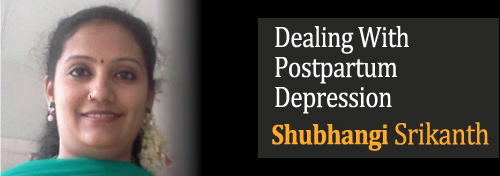Dealing With Postpartum Depression
Having a baby brings with it a lot of emotions. While on one hand you are grappling with the baby’s frequent nappy changes and cries for being fed, on the other hand you are struggling with the changes in your own body, your lack of sleep and irritability. While holding a baby in your arms is the most joyful feeling on earth, no amount of reading or helpful advices can prepare a mom for the sudden changes that she will be faced with now.
A friend of mine became a new mom a few months ago. She had conceived after almost 6 years of marriage and I was ecstatic looking at her newborn bundle of joy. But her reaction to the birth was hardly joyful. I found her inexplicably crying on some occasions, and getting angry for no reason at other times. She would often complain of headaches or sleeplessness and I thought it could be the result of the baby’s changing sleep patterns or even due to her age. Most women do go through some form of depression after delivery and over a period of two to three weeks they also come back to normal having adjusted with the baby’s sleep and feeding cycles.
But when her symptoms would not go away even after two months, I suggested that she see a doctor. Speaking to the doctor, we realized that some women indeed have postpartum blues or depression that continues well beyond the first few weeks.
What is postpartum depression or PPD?
PPD is more a combination of hormonal, biochemical, environmental, psychological and genetic factors. Pregnancy is capable of causing all these changes in a woman and post delivery it could cause them to go into a state of depression. Women, who have been depressed during their pregnancy, suffer from a history of depression or are facing difficulty in their marital life or job, could suffer from PPD.
Some women become fearful of handling the child, imagining that they might cause it harm, while some women may go to the extremes of purposefully wanting to hurt the child thinking it to be cause of all problems. There may be hallucinations, bizarre thinking, paranoia, mania, delusions, or even suicidal impulses.
How can you deal with PPD?
Know that the feelings are temporary
You are not a bad mother at all and neither are you alone. Most women have gone through what you are going through, and they have gotten well, so don’t worry. Things will be fine. Just take care that you sleep well, eat well and eat right. Dress well, find time to relax, go for a walk. Do what makes you feel good. These blues are temporary and will soon go away.
Hire help
If you are unable to manage with the child, take help from someone – your mother, mother-in-law, a female member of your family or friends who are willing to devote time to take care of the baby. If no one is available, hire outside help, possibly an old trusted nanny. Enlist your husband’s help in taking care of the baby. Divide chores for a few months till you are capable of taking care of the baby yourself.
Talk to someone
Discuss your feelings with a family member, friend, a support group of similar moms dealing with PPD or a doctor. Sometimes talking about the whole problem may help you feel better. Spend time with your partner and let him know how you feel. Not venting your feelings can make things worse.
So if anyone you know is suffering from PPD, talk to them. Let them know they aren’t alone. And make sure they feel loved.
My name is Shubhangi Srikanth and I write under the pen name Titli. I started my blog “The Little Princess” and it helped me channel my thoughts in the proper direction. After having worked for more than 12 years in the Pharmaceutical and Banking sector, I now freelance as a content writer for medical and health websites. I have two adorable boys, who have taught me more about life than I could teach them. Being a mother is one of the most fulfilling roles of my life, one that I wouldn’t trade for anything in the world!

